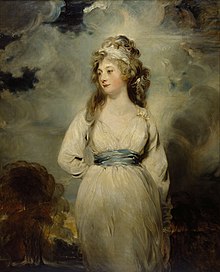 |
| Amelia Anne Stewart, Marchioness of Londonderry (20 February 1772 – 12 February 1829) |
Amelia Anne Stewart, Marchioness of Londonderry (20 February 1772 – 12 February 1829), from 1794 until 1821 generally known as Emily Stewart, Lady Castlereagh, was the wife of the Georgian era Irish statesman Robert Stewart, Viscount Castlereagh, who from 1812 to 1822 was British Foreign Secretary and Leader of the House of Commons. Well-connected by birth to the aristocracy and wife of a prominent politician who was Britain's leading diplomat during the close of the Napoleonic Wars, Lady Castlereagh was an influential member of Regency London's high society.From Wikipedia
She married Robert Stewart, son of the Irish politician and landowner Robert Stewart, 1st Marquess of Londonderry, in 1794. Her husband used his courtesy title, Viscount Castlereagh, from 1796 until 1821, when he was created 2nd Marquess of Londonderry on his father's death.
They were a notably devoted couple but had no children. They did, however, care for the young Frederick Stewart while his father, Charles, Lord Castlereagh's half-brother, was serving in the army.[1] Her devotion to her husband, combined with her love of foreign travel, well equipped Emily for the life of a diplomat's wife, and she was noted for her constant willingness to accompany her husband abroad, no matter how rigorous the journey.
Although there is no doubt that she was concerned by her husband's deteriorating mental condition, which culminated in his suicide in August 1822, she may not have realised quite how serious the matter was : even days before the suicide she was insisting, in public at least, that while he had been "unwell" he was expected to recover fully. During his last days she was undoubtedly fully aware of his dangerous condition, but was forced to trust in the skill of their doctor, Charles Bankhead. Afterwards she was blamed, perhaps unfairly, by many of his friends and political colleagues for concealing the serious nature of his mental illness: Lord Liverpool, the Prime Minister, in particular accused her of deceiving him about the extent of the problem.[2]
After her husband's death Emily lived quietly in the country for almost two years. In 1824 she returned to her old social life, arousing the censure of some of her husband's friends who thought her conduct unfeeling.[3] However her health soon failed and she died in 1829.
During the Regency of George IV, Lady Castlereagh, along with Lady Jersey, Dorothea Lieven, Lady Cowper, and others, was a Lady Patroness of Almack's, one of the first and most exclusive mixed-gender social clubs in London. In their role as Patroness, they had great influence over the ton, determining social acceptance by designating who might receive "vouchers" (entrance tickets) to Almack's, thereby setting and enforcing complex, unwritten social codes of the London social elite.
Credited with having introduced the quadrille to London, Lady Castlereagh is also remembered for having Almack's doors closed, without exception, at eleven o'clock, even once turning away the Duke of Wellington.[4] Her own parties were considered dull, and her manner was somewhat eccentric: guests described her conversation as an endless flow of trivial information delivered in an oddly detached manner.
At their country home, Loring Hall, North Cray, Lady Castlereagh kept a private zoo, which featured antelopes, ostriches, kangaroos, and a notably bad-tempered tiger.
Lady Castlereagh is often mentioned in Regency novels, most famously in Georgette Heyer's Regency romances.
Further Reading:
Amelia Stewart, Lady Castlereagh, the Marchioness of Londonderry - English History Authors(There are some great resources on this post.)
Regency Women of Character: Lady Castlereagh - Regency Reader
There are a number of posts she's included in over at The Things That Catch My Eye
Lady Castlereagh (1772 – 1829) - Regency World at candicehern.com
Lady Amelia "Viscountess Castlereagh" Hobart Stewart - Find a Grave

No comments:
Post a Comment
Hi Janeites! Thank you for visiting our website. We invite you to comment on our content. Of course, Lady Catherine would believe us all to behave like gentlemen and ladies, so please let us not disappoint her.
Also, please leave comments in English, as only Lady Catherine, had she ever studied a foreign language, would be a great profient enough to read such comments. (Merci! Arigato! Gracias!)